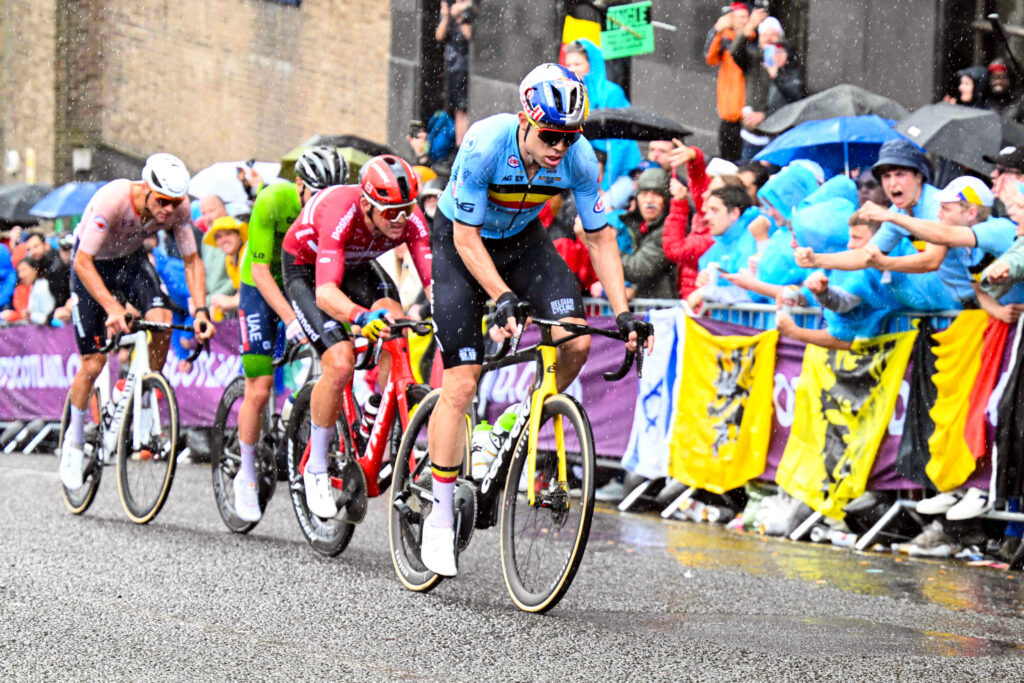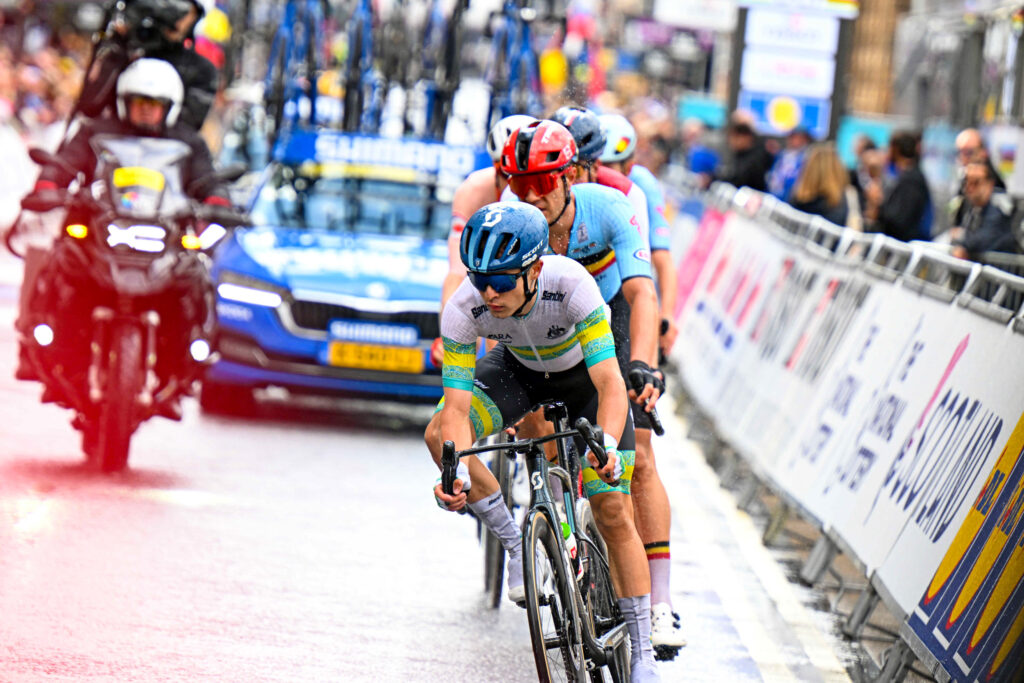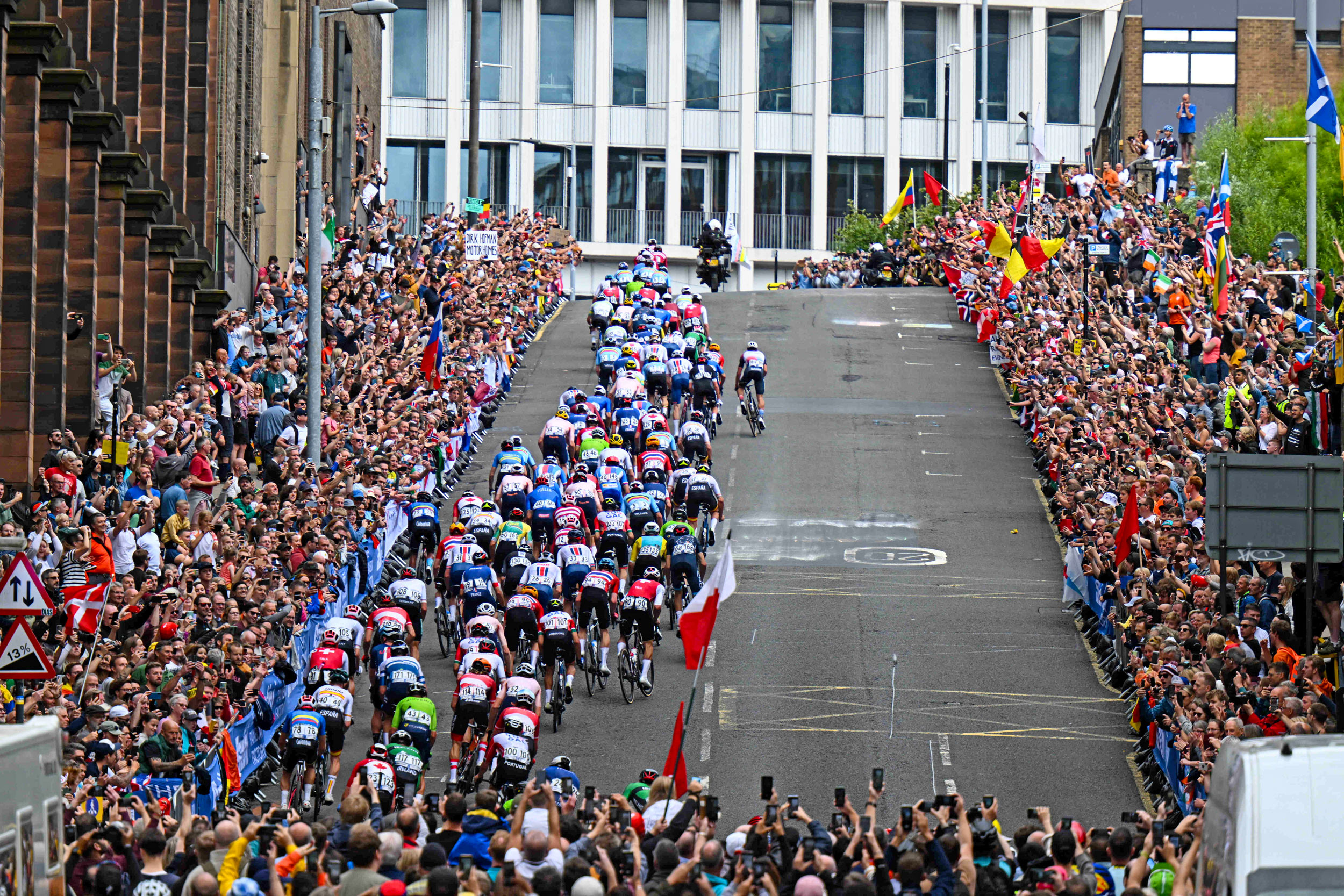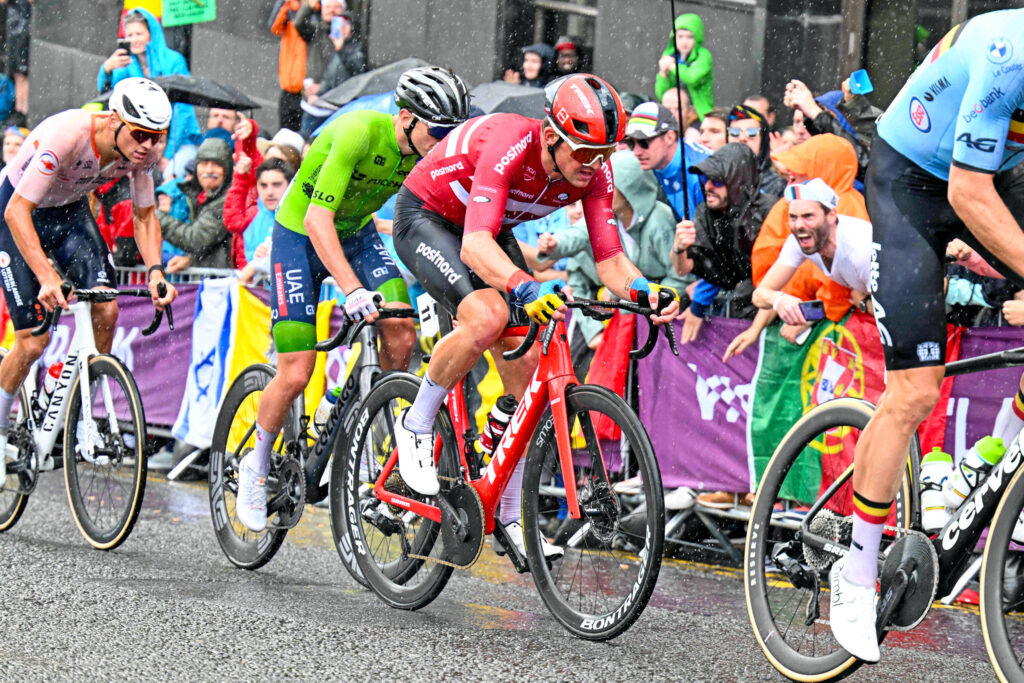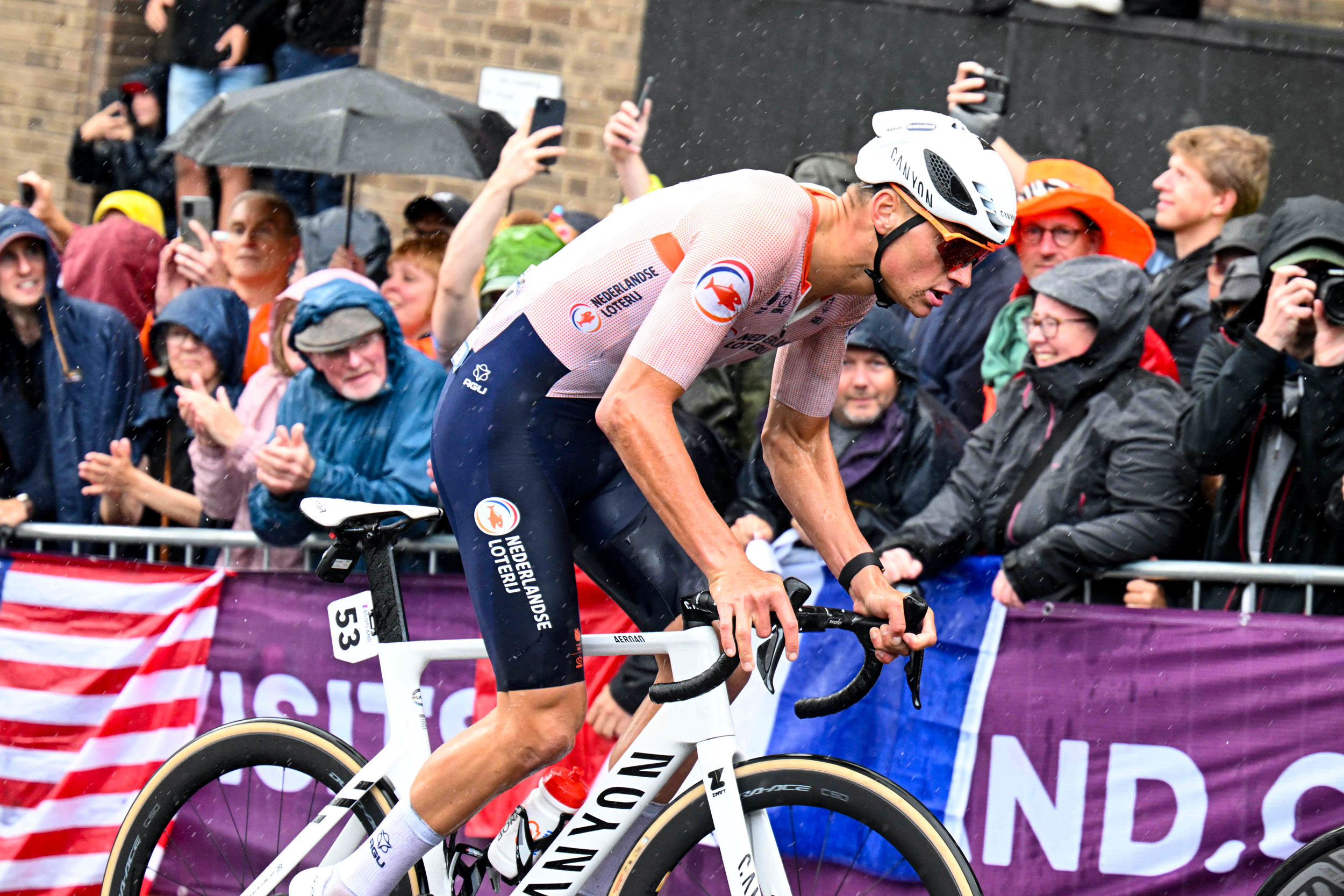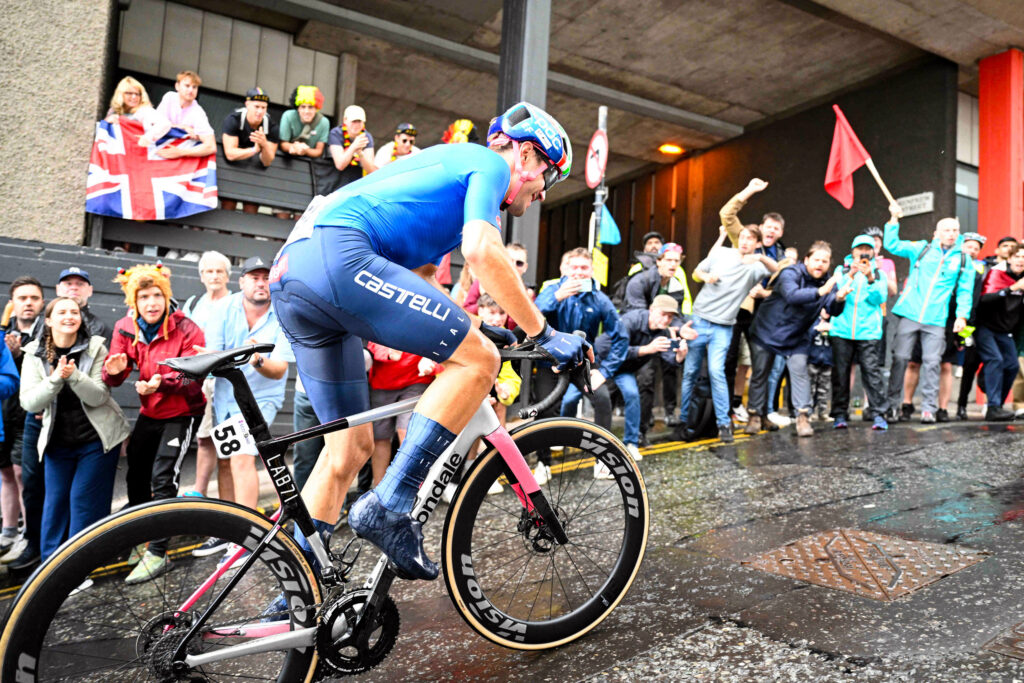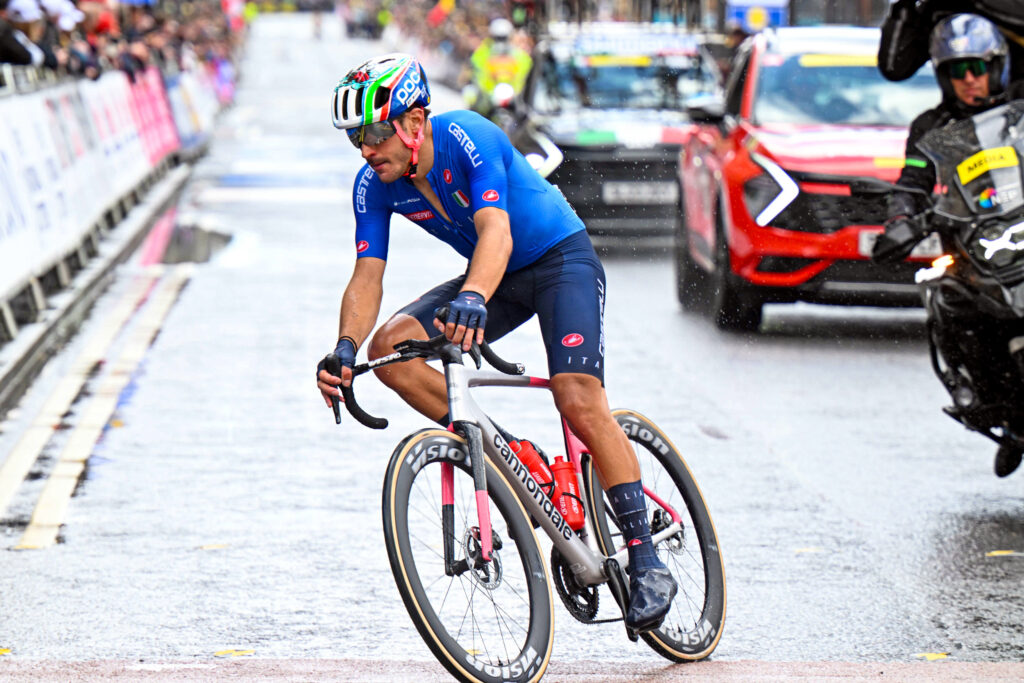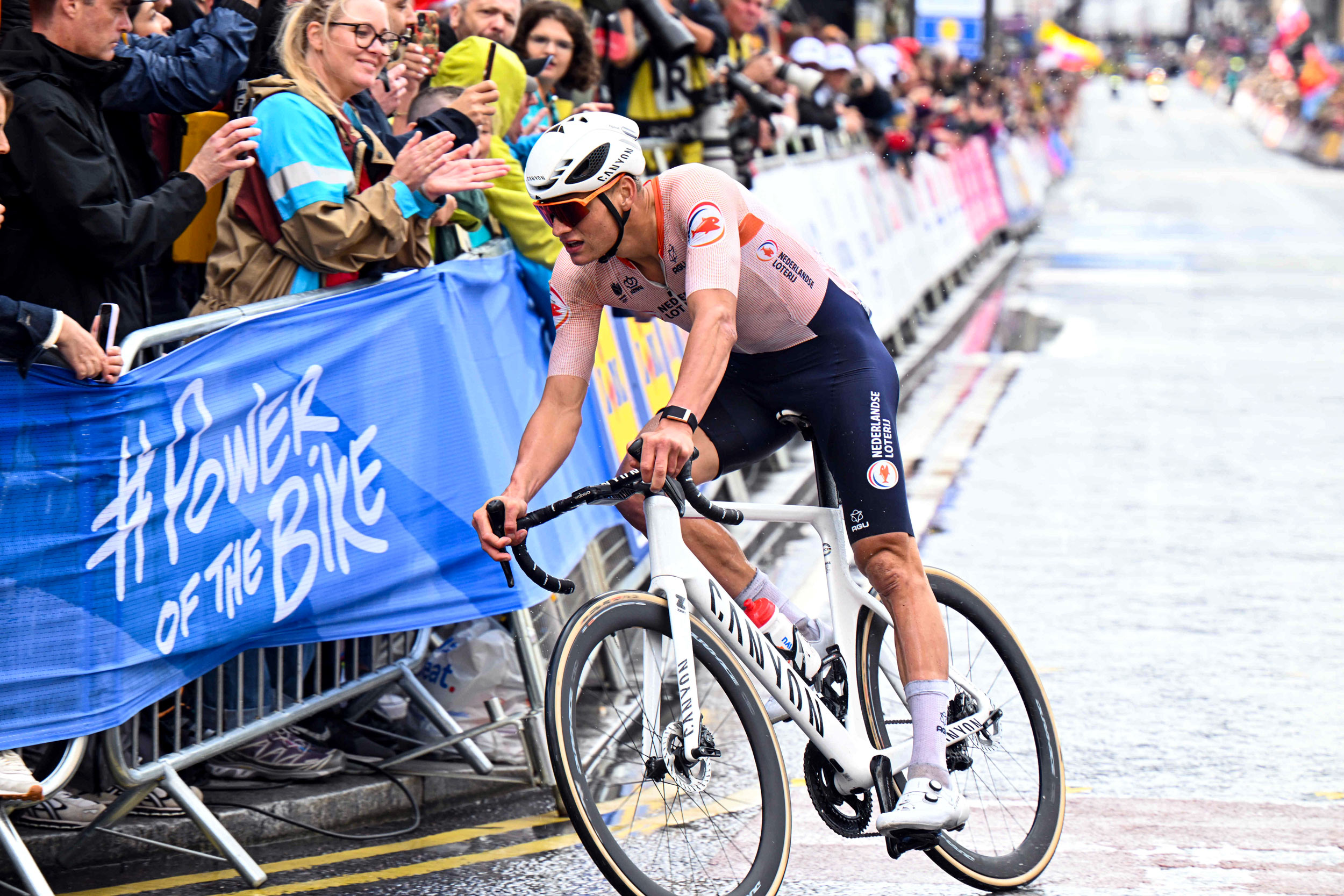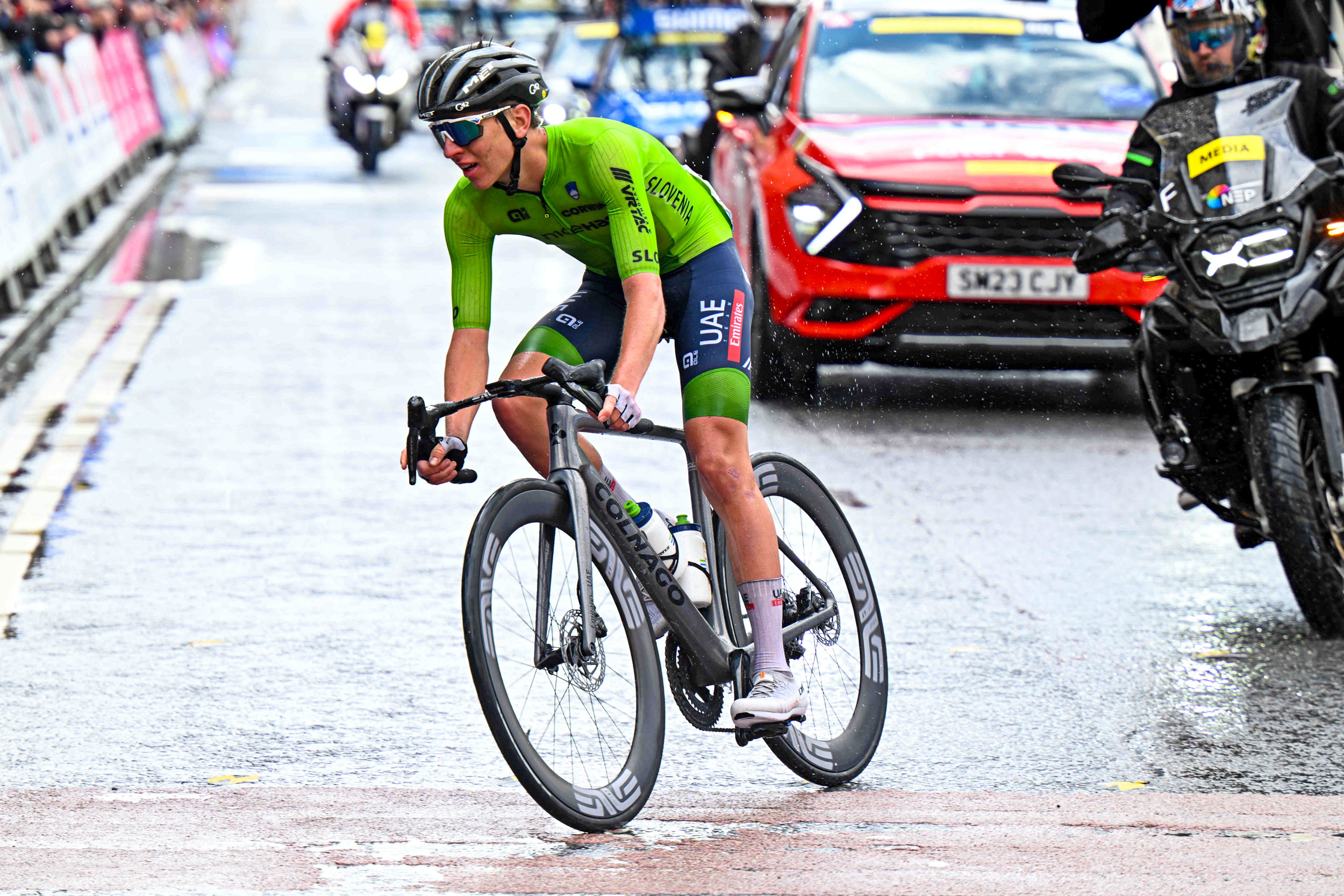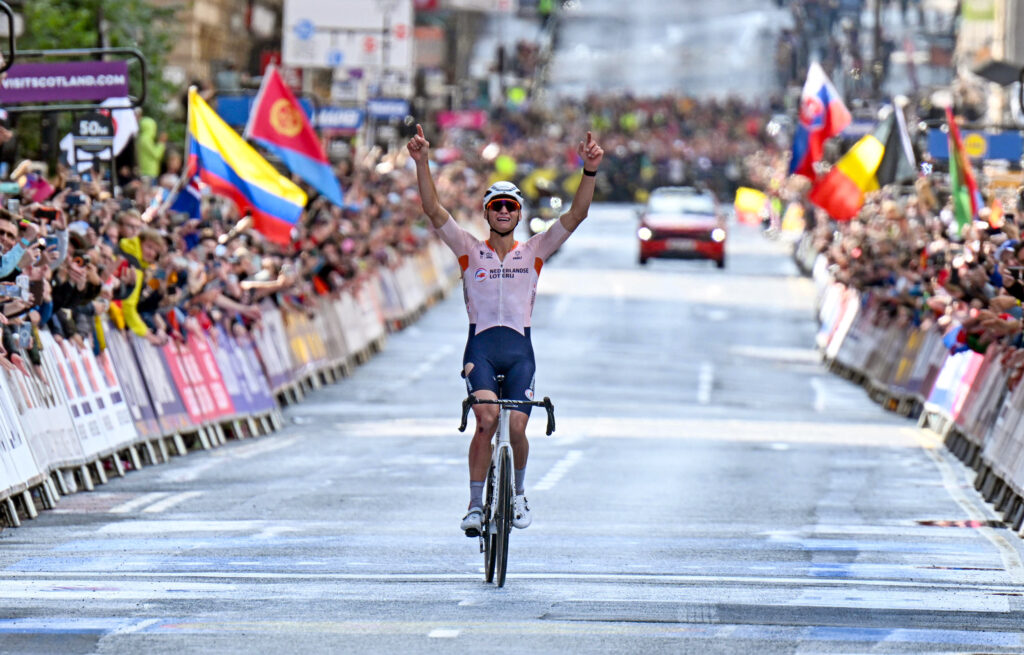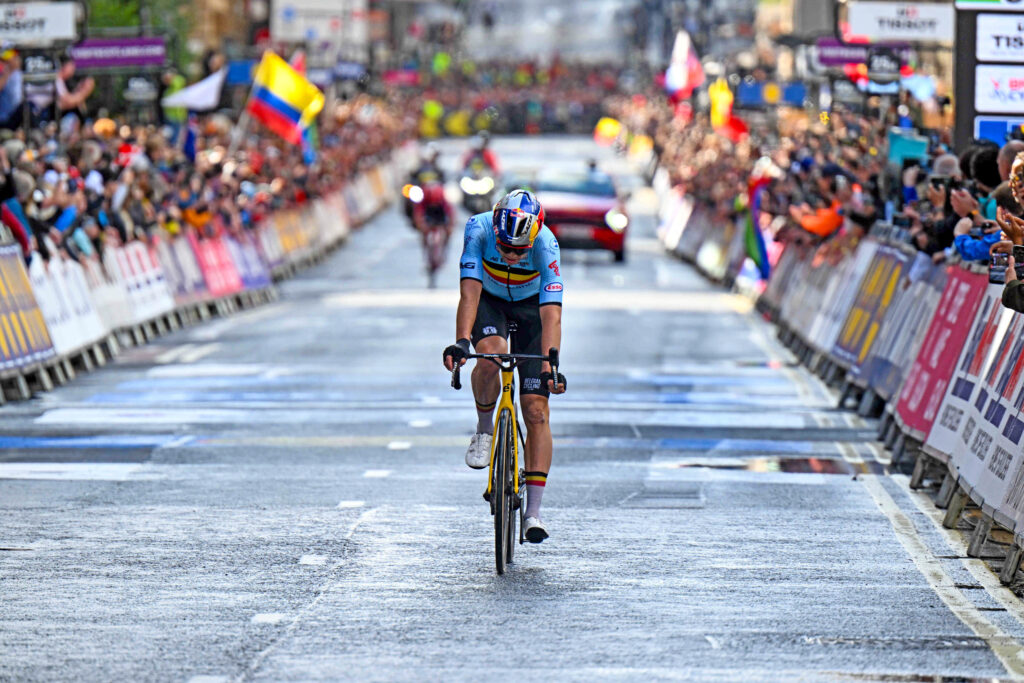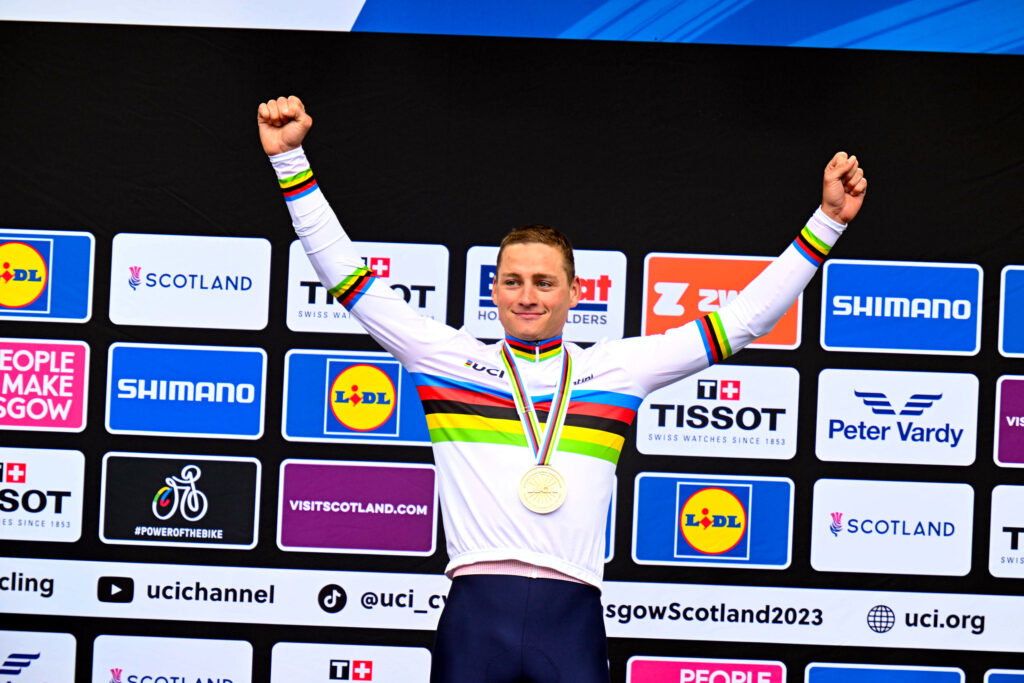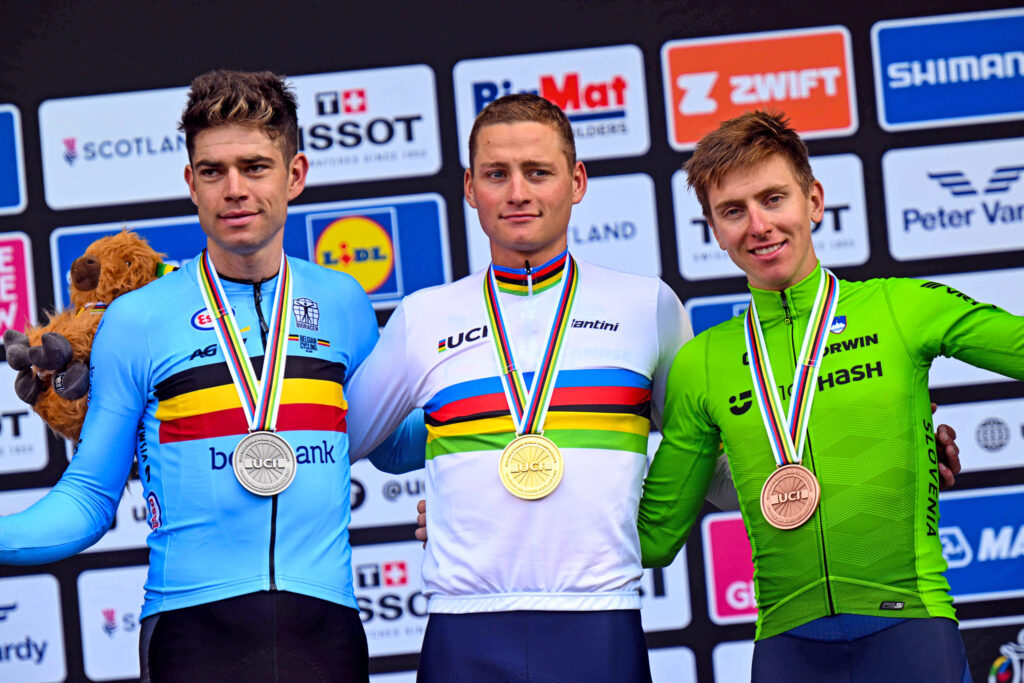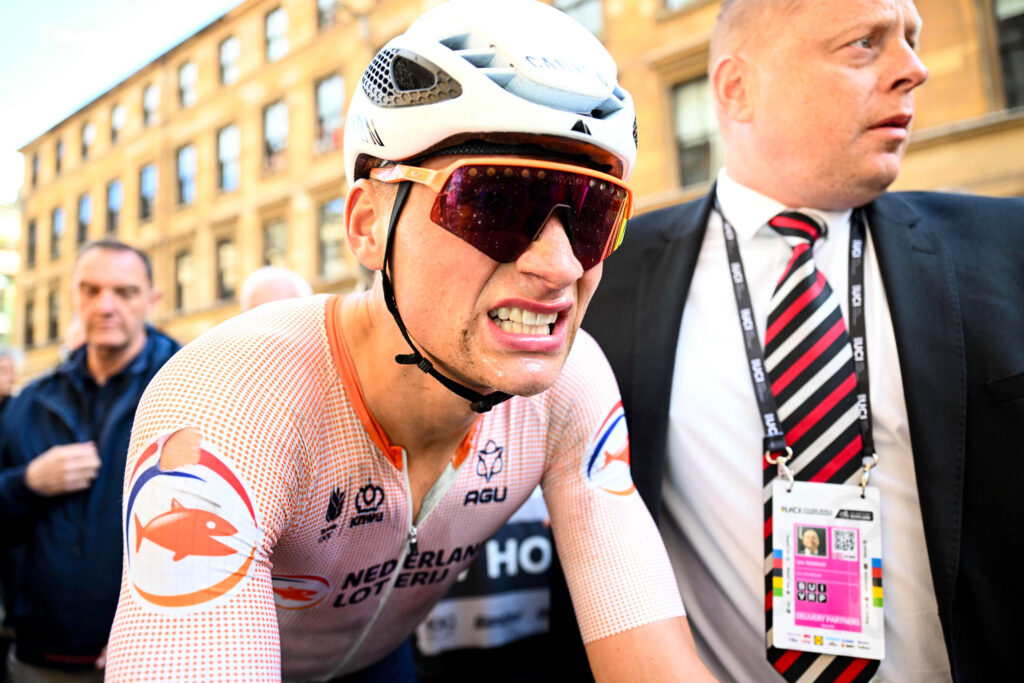Matthieu van der Poel won the 2023 world championship road race on a course that ensured a display of enormous physical strength, mental fortitude, and technical skills. The podium of this race in Scotland was always going to be special.
– By Kenny Pryde in Glasgow (Photos: Stefano Sirotti)
Lord knows there were complaints about the Glasgow city circuit for the road races in the UCI’s mega cycling world championships. It was said to be dangerous and ugly, that it had too many corners, too many potholes and pinch-points – but for all of that, the 2023 world road race championship podium featured the best riders in the sport. None of which completely negates criticisms of the circuit, but it does rather prove that the best riders can race anywhere.
As the 193-rider field rolled out of the start in Edinburgh, it didn’t take long for the day’s early break to form. It comprised nine riders, including Matthew Dinham for Australia, Owain Doull (GB), Ryan Christensen (NZ), Krists Neilands (Latvia), Petr Keleman (Czech Replublic), Kevin Vermaercke (USA), Patrick Gamper (Austria), Harald Tejada (Colombia) and Rory Townsend for Ireland. Astonishingly, one of those riders made it into the top 10. Seventh, in fact, for the 23-year-old Dinham.
Almost inevitably for an event such as this in the UK, after two hours of riding, the race was held up by protestors. It became an exercise that tested the UCI’s ability to explain the circumstances and/or simply resolve the situation and get the race moving again.
During the time it took to clear the road, information about the protest was scant – certainly from formal channels – but eventually a statement was issued about the disruption.
“Further to Police Scotland’s confirmation of a protest in the Carron Valley area, which has temporarily interrupted the men’s road race, we are working closely with all relevant authorities to minimise disruption to the race and also to ensure the safety of riders as our…
— UCI (@UCI_cycling) August 6, 2023
Nobody was informed about them or the motivation of the protesters – whether they wanted Palestinian rights, women’s rights established in Afghanistan and the Middle East, or just for everyone to buy less stuff. Whatever it was, the riders had 55 minutes to chat, eat and admire the scenery and newly-laid asphalt in the Carron valley.
Never has a peloton in an event of this stature had more time or better scenery to deal with comfort breaks and natural needs.
Once the bunch got rolling again there was an increased sense of urgency to bring the nine-rider break back to heel and the Belgians took matters in hand. Those with ambitions realised that on the technical Glasgow circuit an organised pursuit wouldn’t be easy, which is why the Australian pairing of Luke Plapp and Luke Durbridge stayed close to the front, riding in support of their designated leaders for the day, Michael Matthews and Simon Clarke.
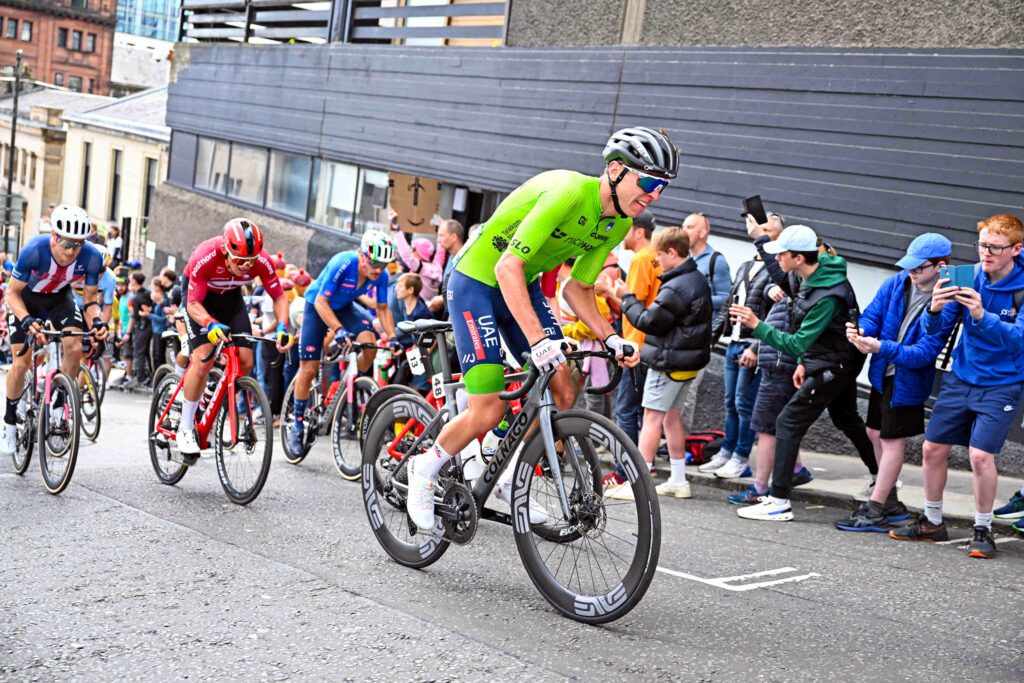
Tadej Pogacar was on a good day… but he would sprint over the finish line in 3rd place after a battle with former world champion Mads Pedersen.
Of course there were a couple of long straights providing a good line of sight in Glasgow, but since they were often on descents, the speed differential wouldn’t be great. The break could reach speeds of ±65km/h and so did the chasing bunch, so the pace on the run-in to the Glasgow circuit quickly ramped up.
With 111km gone, the race closed in on the 10 testing laps of the 14km Glasgow circuit. The escape group had 4:48 on the bunch which was still being led by Australian and Belgian riders.
Into Glasgow proper, the Danes showed their colours too. There might have still been 147km to go and the break was now under four minutes but nobody, it seemed, was taking any chances – the break was going to be brought back sooner rather than later.
All those race circuit pinch-points identified by concerned observers in the lead-up to the racing seemed to vanish as the rapidly thinning bunch strung itself out on the punchy climbs that peppered the circuit.
It created a scene that was very much like the approach to the entrance of the Trouée d’Arenberg in Paris-Roubaix; it seemed every team manager had given the same instruction, ‘Get to the front!’ (Albeit without the use of race radios which, for one major race each year, are off limits.) There would surely have been the other obvious tips: ‘Don’t get caught behind crashes or splits.’ ‘Be vigilant.’ And, in a race like this, ‘Keep close to MVDP and WVA…’
The world championship road race has so many variables but in 2023 it doesn’t take a master tactician to know that the Dutch Classics maestro and his versatile Belgian rival are going to be in the mix when it matters.
True to form, following the script that has been such a feature of the careers of Mathieu van der Poel and Wout van Aert, the obvious favourites for any one-day race would put on a master-class of bike riding, with their usual displays of power, agility, endurance and teamwork.
Once again, this dominant pair would animate the action and create a carnival atmosphere on the streets of Scotland’s largest city. Thanks to the prestige associated with the race, the riders put on such a show that early cynicism about the circuit was forgotten.
The grumbling turned to cheering and, as the peloton counted down the laps, the anticipation grew.
Favourites to the fore
For the first passage over the finish line in George Square, the break had 3:43 on the peloton that was being led by the Danes. There were 10 laps to go and the peloton was already at top speed, strung out in one snaking line with gaps appearing in the group of around 60 riders.
How many were going to make it another 140km to the finish line? How many, in fact, were still racing? And how many were just doing their best to keep following wheels? Two laps later, the riders from the early break were still hanging on, but there were only 31 riders remaining in the group of favourites that was still in hot pursuit.
For all the concerns about the circuit, the most spectacular and impactful crash was suffered by Italian pre-race favourite Matteo Trentin while sprinting up the short, steep Montrose street climb. The Italian somehow managed to clip the foot of a barrier and came down in a flash. Stunned and nursing his wrist, his race was finished.
Trentin’s misfortune prompted the Italians to enact ‘Plan B’: B, in this instance, stood for Bettiol.
The winner of the 2019 Ronde van Vlaanderen has proven his qualities in big races before but Alberto Bettiol was on nobody’s list of pre-race favourites. Still, the 29-year-old who races with the EF Education-EasyPost trade team bravely attacked and, in the twisty city centre, he was quickly out of sight.
Bettiol stuck to his task though and had built up a 42 second lead with 42km to go.
With the action hotting up and the rate of attrition taking a toll on the strength of the chase, there was another crash in the lead group, this time it was more consequential.
Ecuadorian Jhonatan Narvaez couldn’t do anything to save himself from a touch down after his front wheel slid out from under him on a fast, wet right-hander. Down he went, sliding into the barriers… and he wouldn’t be the last to do so.
The small split resulting from Narvaez’ slide was all it took to create a little hesitation, a slight loss of confidence in the rain, and it was the moment when four prominent riders went clear: Mathieu van der Poel and Wout van Aert – of course – as well as the Slovenian superstar Tadej Pogacar and the the most recent winner of a world championship in Great Britain, Mads Pedersen of Denmark.
A gap appeared and rapidly grew.
With this quartet in pursuit, Bettiol’s bid for glory was effectively doomed.
Behind the four chasers, the remnants of the peloton stalled and there were three Belgians to dissuade any determined pursuers whose hearts surely sank when they worked out who featured in the quartet that had opened the gap. There simply wasn’t the horsepower or cooperation required to reel back in the leaders. By that point, even if the Belgians hadn’t been marking them, the battle for line honours was rapidly being reduced until it was clear that the elite selection up front was swapping off in their bid for the rainbow jersey.
Bettiol’s bid foiled…
With two laps to go, Bettiol still held a 23-second advantage over four of the strongest riders in world cycling. What was left of the front group was led limping over the finish line by attentive Belgians, already 1:22 down. Most in this group looked as though they wanted to climb off, wave the white flag and call a result. Up front, however, Bettiol looked like a rock, 100 percent determined to continue his effort, still totally committed to racing for victory. He knew that if he was caught it was all over. He’d have nothing left to respond to further surges…
Considering the quality of the chasers, the bold Italian’s 23 seconds was never going to be enough.
Approaching the climb out of Byres road, his lead shrinking, Bettiol eased back and prepared himself as best he could for the inevitable capture. But once on the Great George Street climb MVDP attacked at full pelt, flashing past the fading Italian and – just like that – speeding ahead and vanishing from the view of the chasers.
MVDP onwards to victory
There were still 21km to go but – with the roads a mix of rain-slick and bone dry, the sun blindingly bright one minute and gone the next – it wasn’t yet a foregone conclusion that the dominant Dutchman was going to pull off his coup.
Conditions were, as they say, ‘mixed’. But who better to exploit that than MVDP? As he so often is when there’s a major race to be won, the 28-year-old was a determined bundle of power with a reputation to match his Adonis aesthetic. In Glasgow, the King of Punchy Climbs relished the slippery conditions.
He has proven his pedigree on all manner of terrain, and on bikes of different kinds, and with a level of skill that makes cycling beautiful. His bike handling capabilities are well known, so too his ability to maintain bursts of power like few in the peloton could even dream of. And yet even the Dutchman was revealed as fallible.
Van der Poel seemed to have the rainbow jersey within his grasp but he didn’t have things entirely his way once he was in the lead, desperate to build his advantage.
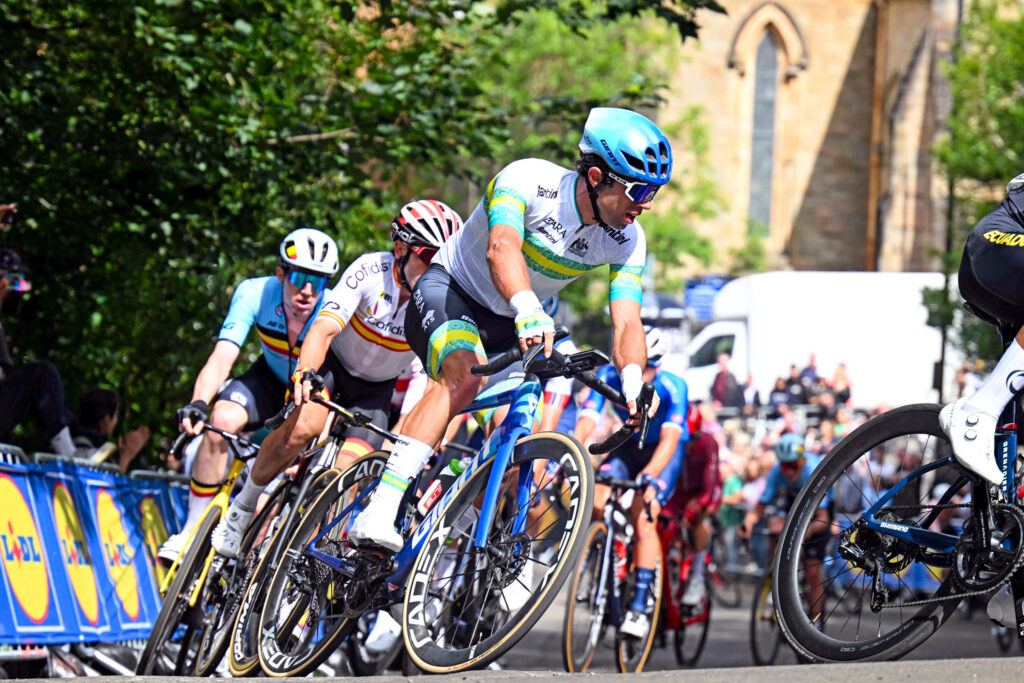
Michael Matthews, third last year, was one of the 142 riders who didn’t last the full distance… DNF in 2023.
The large crowds in Glasgow – and the many watching on via the long live TV broadcast – were treated to images of bravado that are fitting for a world championship title fight. And while the excitement was already building, MVDP added an extra element when he crashed on what seemed a relatively innocuous right-hand turn.
It looked like a huge moment that would impact the result. His bike slid underneath the barriers on the roadside and all logic suggested that a replacement would be required… or, at the very least, some mechanical work called for.
The crash added to the drama but it later became apparent that those who were in pursuit of the race leader weren’t aware of his misfortune.
Race radios aren’t part of the world championship equation. Information is scant in this competition between national teams big and small and inevitably tactics that might have come into play had riders been informed never eventuated.
Had Pogacar, Pedersen and van Aert known about the incident up front, would they have intensified their chase? Would it have been possible to reel in the inspired escapee? We’ll never know.
The world championship offers prestige and a rainbow-coloured prize that reminds the winner of their accomplishment every time they line up for subsequent races for the following year. But the lack of radio communication in these races also adds spice for the viewers, and confusion for the riders.
Cycling has evolved significantly since a Dutch rider last won the elite men’s road race world title, but MVDP managed the moment to perfection. The crash that could have cost him the win may have slowed him momentarily, but it also provided a surge of adrenaline that served him well.
“I still don’t know what happened to be honest,” said van der Poel about the crash. “I was really not pushing or taking any risks and, all of a sudden, I was on the ground.
“I was lucky that my bike was okay and [I was] able to keep going.”
He barely stopped. After retrieving his undamaged bike from beneath the barriers, MVDP was up and off again, still ahead of the chasers who were oblivious to his mishap.
His skinsuit was shredded, his right shoe’s BOA tightening system wrecked and the cleat damaged, but the adrenalin rush merely added fuel to his title-winning effort.
With a lap to go, just 14 more kilometres to cover, van der Poel was a picture of pained determination, ripping bits of his tattered shoe as he crossed the finish line for the bell lap.
Already 31 seconds back the elite trio of chasers – Pogacar, van Aert and Pedersen – looked spent, already resigned to their fate. Up ahead, van der Poel admitted that he had lost a bit of confidence in the corners but, “I knew my legs were strong and I could push on the straights and the climbs.”
There’s no way you could call the final lap of any world championship road race a ‘procession’. There is always too much at stake.
The slippery circuit required immense skill and concentration, but MVDP’s win was effectively in the bag as the chasing trio each began to work out how they were going to play their own finale – three riders in search of only two medals.
On the final fast descent back into the finish area at George Square, MVDP’s traditional rival opened a gap to the two others in pursuit of the Dutchman.
WVA vs MVDP has become one of modern cycling’s traditions and it was happening again in Scotland.
The inspired Belgian did what he could to close in on the Dutchman at the front, and he held his advantage over the other pair… but failed to close in on the rider who was about to celebrate his second world championship victory for the year.
Gold again for Mathieu van der Poel, but this time on the road to mark the first victory for the Netherlands since Joop Zoetemelk in 1985. It is also the first time in elite men’s cycling that a rider has claimed the rainbow jerseys of both cyclocross and road cycling in one season. (This double has, of course, been achieved before in the women’s ranks… three times, in fact. All of them by the same Dutch rider: Marianne Vos – in 2006, 2012 and 2013.)
Van Aert maintained his advantage in the race for silver, ensuring yet another podium appearance with his long-time rival. Meanwhile, Pedersen and Pogacar arrived in the finish straight to see the Belgian cross the line for second place before sprinting for bronze. In a remarkably close contest after over six hours of racing at an average speed over 44km/h, Pogacar won. Bronze for the ‘other star’ of the spring Classics of 2023 while gold goes to the winner of Milan-Sanremo and Paris-Roubaix.
It was, Pogacar said, “a sprint of the walking dead”, adding that he wished Pedersen could have been on the podium too, because the Dane had worked so hard.
After a season which has seen him win two of cycling’s ‘Monuments’, you could say van der Poel has enjoyed a remarkable year. It’s true but this latest win – another chapter in the story of one of cycling’s most fascinating rivalries – is the most special, according to the rider himself.
“I’ve been thinking about this race for a year,” van der Poel explained later, insisting that his cyclocross and mountain bike skills had little to do with his win.
“You just need good legs for this course. It was just so hard.
“You have to sprint out of every corner and still have steep climbs too. After 250km it starts to hurt everybody and the strongest come to the front.”
The Dutchman’s “good legs” were instantly evident to all in the leading quartet.
“I knew I had another attack left but, to be honest, I was surprised that my first attack was the good one. When you look back after an attack like this and see there is nobody on your wheel it gives you a lot of confidence and you know that you are the strongest in the group. That’s a really good feeling,” reflected van der Poel.
If that one attack had given van der Poel confidence, it knocked it out of the others and his fellow podium finishers were quick to acknowledge that as soon as he was gone, they were racing for minor placings.
The new world champion admitted there would be a celebration before his next race – the mountain bike XC world championship on 12 August.
“I want to qualify for the Olympic Games in Paris,” he explained, “but it has been a really long time since I’ve been on the mountain bike so I’ll just try to enjoy myself in the coming week and we will see where it brings me.” We’ve been warned.
– By Kenny Pryde


